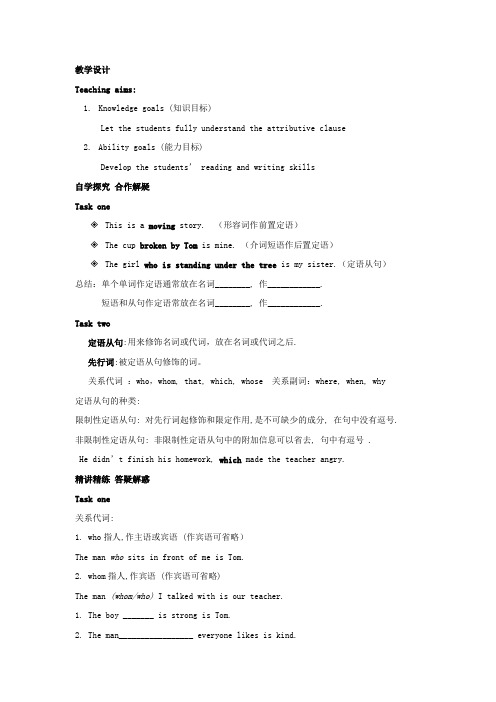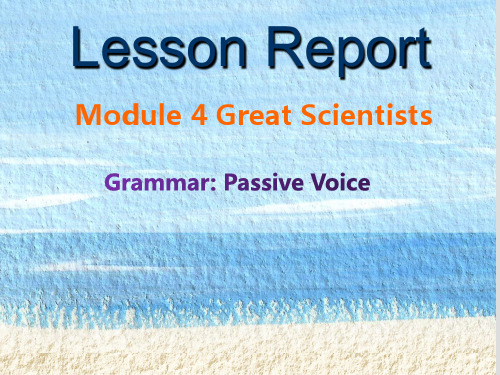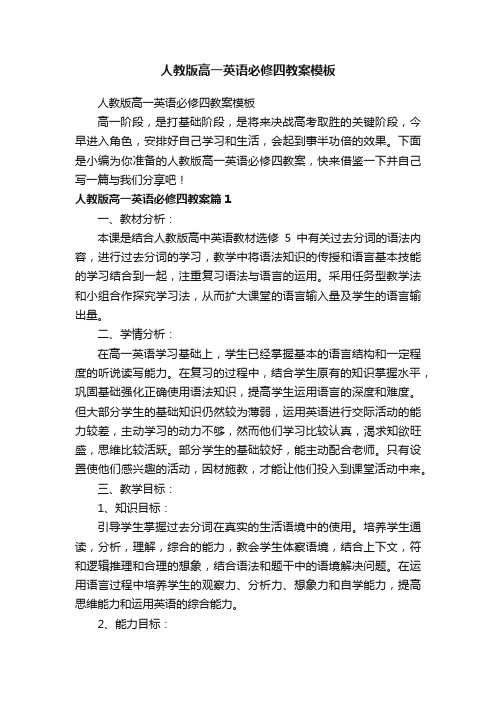新疆克拉玛依市第十三中学人教案高一英语必修四课件:语法专题——介词
高中英语_必修一 unit4 语法教学设计学情分析教材分析课后反思

教学设计Teaching aims:1.Knowledge goals (知识目标)Let the students fully understand the attributive clause2.Ability goals (能力目标)Develop the students’ reading and writing skills自学探究合作解疑Task one✧This is a moving story. (形容词作前置定语)✧The cup broken by Tom is mine. (介词短语作后置定语)✧The girl who is standing under the tree is my sister.(定语从句)总结:单个单词作定语通常放在名词________, 作____________.短语和从句作定语常放在名词________, 作____________.Task two定语从句:用来修饰名词或代词,放在名词或代词之后.先行词:被定语从句修饰的词。
关系代词:who,whom, that, which, whose 关系副词:where, when, why 定语从句的种类:限制性定语从句: 对先行词起修饰和限定作用,是不可缺少的成分, 在句中没有逗号.非限制性定语从句: 非限制性定语从句中的附加信息可以省去, 句中有逗号 .He didn’t finish his homework, which made the teacher angry.精讲精练答疑解惑Task one关系代词:1. who指人,作主语或宾语 (作宾语可省略)The man who sits in front of me is Tom.2. whom指人,作宾语 (作宾语可省略)The man (whom/who) I talked with is our teacher.1. The boy _______ is strong is Tom.2. The man_________________ everyone likes is kind.3. which 指物,作主语或宾语 (作宾语可省略)The apple _______ is red is mine.Can you lend me the book ___________you talked about last night.4. that 指人/物,作主语或宾语 (作宾语可省略)A plane is a machine ________ can fly.He is the man _________I talked with.(1) The scientist is very famous. We met her yesterday.The scientist ______________________ we met yesterday is very famous. (2) The dress is new. She is wearing it.The dress ________________she is wearing is new.5. whose 人/ 物作定语表所属关系This is the girl ________ mother is a doctor.This is the house ________ windows face south.注意:如果whose所修饰的是物,常用“ the +名词+of which ” 代替“whose+名词”(1)This is the building whose walls are green.This is the building the walls of which are green.(2)The dictionary whose cover has come off is mine.The dictionary ______________________has come off is mine.6. as引导的定语从句(1)as 引导非限制性定语从句,用于固定搭配中,意思是“正如”。
人教新课标高一英语必修四教案:Unit+1+Women+of+achievement+重点短语讲解.doc

Book 4 Unit 1 重点短语讲解1. She devoted all her life to medical work for Chinese women and children. (P1)【归纳】devote... to... 意为“献身,致力于”,指把自己的时间和精力等奉献给某种工作或事业。
devote 的宾语是oneself, one’s time, one’s life等,to是介词,后接名词、代词或动名词。
【延伸】to作介词后可接doing / n. / pron.,常见的动词短语如下:be / get used to习惯于;get down to开始认真(做某事);lead to通向,导致;look forward to盼望,期待;pay attention to注意;prefer doing to doing宁愿……不愿……;stick to坚持;object to反对,不赞成;see to照料,照顾;be up to从事于;belong to属于;in addition to除……外。
【易错点】devote后没有宾语时,应用be devoted to... 形式。
如:His whole life was devoted to teaching.2. By chance I came across an article about a doctor called Lin Qiaozhi... (P6)【归纳】by chance = by accident意为“恰巧,碰巧,偶然,意外”。
【延伸】give sb a chance 给某人一个机会;get / have a chance有机会;take a / one’s chance 碰运气,冒一冒险;there is a chance that... 有可能,有希望。
【易错点】by any chance与by chance 意思不同,by any chance表示“万一,也许”,在句子中作插入语,它一般用于否定句,疑问句或条件状语从句中。
人教版高中英语必修一Unit4 的语法(定语从句)说课课件(共24张PPT)

Part four:Homework.(具有承上启下的作用,有助于下节课学习)
1.Remember the table
2. show you a writing with attributive
clauses. (提前老师把复印好的writing范文发给学生下去)
3. finish your own writing with attributive
Which boy is my son?
My son
Jack
裤子是白色的男孩是我儿子。 The boy whose trousers are white is my son.
The boy the trousers of whom are white is my son.
关系代词的实质
Join the following sentences: A plane is a machine. The machine can fly.
groups.
只用that的情况
•当先行词是all, few,none, some,little, •everything, •anything, •nothing ,或 被every, any, all, some, no, little, few, much •等词修饰时
•当先行词被 序数词或形 容词最高级, 以及极端词
人,物
that
whose
物: which
关系代词:人或物,充当主,宾,定
指代 在从句 功能 中的作用
指代人
指代物
主语
who/that which/that
宾语
whom / which/that
who/that
定语
whose
【公开课教案】外研版高一英语必修四unit4语法课教案

Lesson plan for Great ScientistsT e a c h i n g P r o c e d u r e sDesigning purpose Let Ss learn to observe the sentences’ structures and distinguish the different tenses.The teacher guides the students to make a simple summary of the passive voice they have learned and form a clear concept of it.Stage 3 Practice (10 mins) 1.Ask Ss to do the exercise 1 and exercise 2 of different tenses about the passive voice.Exercise 2Fill in the blanks.Part oneLihui: Let's learn other scientists.Lihua: Cailun is a great inventor I'd like to talk.Lihui: Great,we all know that Papermaking ___________(invent) by him.Lihua:Yes,with the development of society, different types of paper _______(develope) so far.Now, we will make some sentences in passive voice inpassive voice.You know,we should learn not only their forms but alsohow to use them correctly. Ask Ss to discuss the exercise in groupsand finish it.Practice 1: Make sentences according to the pictures and givenwords.2.Write a short dialogue within sive sentences to describe thescientists with the right types of PV. Scientists are asfollows:MadameCurie,Edison ect.3.Give some comments on the Ss’ performance and then give a briefconclusion.DesigningpurposeTrain their team spirit and guide them to combine the knowledgewith different contexts in order to use the passive voice correctly tomake sentences.According to Chomsky, a language learner acquire languagecompetence which enable him to produce language.So theB l a c k b o a r d/P P T D e s i g n(板书/媒体设计)。
必修4Unit2教案:语法知识学习

必修4 Unit2教案:语法知识学习语法是语言的骨架,学好语法是学好语言的关键。
在英语学习中,语法的难度不亚于词汇和听说读写等方面的考试内容。
本文将介绍必修4 Unit2教案中包含的语法知识,以帮助读者更好地掌握英语语法,提升英语能力。
一、关系代词关系代词是连接主句和从句的词语,包括who, whom, whose, which, that等。
在Unit2教案中,阅读部分中的文章《修女与流浪汉》,以及书写任务中的文章《流浪汉的身世》,都涉及到了关系代词的应用。
关系代词who, whom连接主句和从句时,用来引导介绍人的信息,who作主语,whom作宾语。
例如:-The man who is sitting over there is my uncle.-The woman whom I met yesterday is my teacher.Whose引导的从句用来表达所属关系,例如:-The house whose roof was blown off in the storm is now being repaired.Which作为主语或宾语引导从句时,用来介绍动物、事物或抽象概念,例如:-The book that I borrowed from the library is very interesting.-The computer which I bought yesterday cost a lot of money.That作主语或宾语引导从句时,可用来介绍人、动物、事物或抽象概念,例如:-The boy that broke the window is standing over there.-The movie that we watched last night was very exciting.二、非谓语动词非谓语动词指不带有人称和时态的动词形式,包括动名词和不定式。
新教材高一英语Unit4说课教案.doc

新教材高一英语Unit4说课教案新教材高一英语Unit4说课教案一.教学目标理论依据:《新课程标准》(实验稿)根据《新课程标准》(实验稿)关于总目标的定位及其实现途径和目标具体描述,结合高一学生实际和教材内容, 我们把本单元的教学目标定为:1)语言知识:单词:理解、内化、运用以下生词:seismograph;iceberg;KingTut;//roar;fright;crack;//b ookworm;c ouchpotato;workaholic;//Buddha;ag ent 等,扫除听读障碍,重点掌握一些传神动词:advance; se ize;sweep;swallow;drag :pull;flow; shake;strik e;struggle 等。
词组:getonone' sfeet ;t reeaftertre e语法:复习和运用定语从句用于描述人、物及事件。
2)语言技能:听:听懂一个关于不幸经历的小故事,抓住时间、地点、人物、发生的事件说:能用得体语言描述人、物、事件,并且有一定的逻辑。
efulreading , generaliza ti on; inf ere nee 等阅读微技Scanning, s kimming, car能训练。
写:能运用Fir st, Next, The n, Finally简要且富有逻辑地描写自己的一次难忘经历。
3)学习策略:学生一定程度形成自主学习,有效交际、信息处理、英语思维能力。
4)情感态度:学生能在多种英语学习情景中分享自己的幸与不幸,体验用英语交流的成功与喜悦,以及培养合作精神、互助精神。
二.教学重点和难点:重点:1•课文中出现的重要动词,女口:advance ,seize,swee p, swallow, s trike,strug gle, drag, fl ow, shake,及词组getonone' s fee t, pul Ion eself, treea ftertreeetc .2.用关系代词w ho, that, who m, whose等引导的定语从句.3.用副词first, next , then, final ly来描述一场难忘的经历.难点:能用得体的英语表达自己,描述过去的难忘经历。
外研版高一英语必修四unit4语法课-说课课件 18张PPT

II Analysis of teaching materials
1.Teaching content
Grammar 1: The Passive Voice
2.The status of the grammar period
1.teaching content
2.The status of the grammar period
Ability objectives
1) The students will be able to use the passive voice correctly when they want to express in their real life. 2) The students will be able to improve their ability of making sentences correctly by using passive voice .
注意你的思想,它会变成你的言语;注意你的言语,它会变成你的行动;注意你的行动,它会变成你的习惯;注意你的习惯,它会变成你的 性格;注意你的性格,它会变成你的命运。 我们的人生必须励志,不励志就仿佛没有灵魂。 钱可以帮穷人思维的人解决温饱,却可以帮富人思维的人制造财富。 别人能做到的事,自己也可以做到。 痛不痛只有自己知道,变没变只有自己才懂。不要问我过得好不好,死不了就还好。 现代的婚姻并不是情感的产物,更多的是竞争的结晶,选配偶其实就是变相的竞争上岗,而小三就是原配最大的竞争对手。 生命力的意义在于拚搏,因为世界本身就是一个竞技场。 让珊瑚远离惊涛骇浪的侵蚀吗?那无异是将它们的美丽葬送。 学习是一次独立的行动,需要探索、琢磨、积极应战、顽强应战,艰辛由你独自承担,胜利由你独立争取。 其实世界上没有那么多的如果,有时候,我们一瞬间失去的东西就是永恒。 一个人如果不能从内心去原谅别人,那他就永远不会心安理得。 我为你今天的表现感到骄傲。 忍是一种眼光,忍是一种胸怀,忍是一种领悟,忍是一种人生的技巧,忍是一种规则的智慧。 只要更好,不求最好!奋斗是成功之父。
优选高一英语必修第四单元语法演示ppt

Children are taken good care of at school. 孩子们在学校被照看得很好。(指通常的情况)
第十六页,共23页。
e.g:
1. They are building a new library now. 被动 A new library is being built now.
by the local people .
第十三页,共23页。
The habitat of the panda is being protected by the local people .
3. 少数及物动词的进行时表示按计划、安排 将要承受某个动作。
An party is being held tonight.
2. Past passive voice: was/were+ p.p. The last Olympic Games were held
in Athens.
第二页,共23页。
3. Future passive voice: will/shall+ be+ p.p. The 2008 Olympic Games will be held
in Beijing.
am/is/are+ going to be+ p.p. The 29th Olympic Games are going to
be held in Beijing in 2008.
第三页,共23页。
am/is/are+ to be+ p.p.
The 29th Olympic Games are to be held in Beijing in 2008.
人教版高一英语必修四教案模板整理

让知识带有温度。
人教版高一英语必修四教案模板整理人教版高一英语必修四教案模板高一阶段,是打基础阶段,是将来决战高考取胜的关键阶段,今早进入角色,支配好自己学习和生活,会起到事半功倍的效果。
下面是我为你预备的人教版高一英语必修四教案,快来借鉴一下并自己写一篇与我们共享吧!人教版高一英语必修四教案篇5人教版高一英语必修四教案篇7第一部分:热身快速应答:1.How are you going to school everyday?2.Thank you very much for your help.3.Would mind my opening the window?4.What day was it yesterday?5.Whats the weather like today?其次部分:朗读口语朗读技巧:1.声调与降调第1页/共3页千里之行,始于足下。
I have three English books, two Chinese dictionaries and five pens. Do you have a map in your hand? Yes, I do.2.连读:将前一个单词最终的辅音与后一个单词开头的.元音连在一起朗读。
half an hour ran out of not at all3.失爆:当相邻两个爆破音在一起时,往往给前面一个爆破音留一个位置,但不爆破,稍停随即发后面的爆破音,这种现象称为“失爆”。
hot bath the next day a good deal of I don’t believe I don’t know I want to say朗读练习:1. A smart housewife was told that there was a kind of stove which would onlyconsume half of the coal she was burning. She was very excited, and said: Thatll be terrific! Since one stove can save half of the coal, if I buy two, no coal will be needed!2.The little boy did not like the look of the barking dog.Its all right, said a gentleman, dont be afraid. Dont you know the proverb: Barking dogs dont bite?Ah, yes, answered the little boy. I know the proverb, but does the dog know the proverb, too?人教版高一英语必修四教案第2页/共3页让知识带有温度。
人教版高一英语必修四教案模板

人教版高一英语必修四教案模板人教版高一英语必修四教案模板高一阶段,是打基础阶段,是将来决战高考取胜的关键阶段,今早进入角色,安排好自己学习和生活,会起到事半功倍的效果。
下面是小编为你准备的人教版高一英语必修四教案,快来借鉴一下并自己写一篇与我们分享吧!人教版高一英语必修四教案篇1一、教材分析:本课是结合人教版高中英语教材选修5中有关过去分词的语法内容,进行过去分词的学习,教学中将语法知识的传授和语言基本技能的学习结合到一起,注重复习语法与语言的运用。
采用任务型教学法和小组合作探究学习法,从而扩大课堂的语言输入量及学生的语言输出量。
二、学情分析:在高一英语学习基础上,学生已经掌握基本的语言结构和一定程度的听说读写能力。
在复习的过程中,结合学生原有的知识掌握水平,巩固基础强化正确使用语法知识,提高学生运用语言的深度和难度。
但大部分学生的基础知识仍然较为薄弱,运用英语进行交际活动的能力较差,主动学习的动力不够,然而他们学习比较认真,渴求知欲旺盛,思维比较活跃。
部分学生的基础较好,能主动配合老师。
只有设置使他们感兴趣的活动,因材施教,才能让他们投入到课堂活动中来。
三、教学目标:1、知识目标:引导学生掌握过去分词在真实的生活语境中的使用。
培养学生通读,分析,理解,综合的能力,教会学生体察语境,结合上下文,符和逻辑推理和合理的想象,结合语法和题干中的语境解决问题。
在运用语言过程中培养学生的观察力、分析力、想象力和自学能力,提高思维能力和运用英语的综合能力。
2、能力目标:利用多媒体手段营造积极和谐教学氛围,使学生进入情景之中,充分调动学生的思维活动和情感体验,规范学生运用英语知识准确表达的能力,同时,发展学生综合语言运用的能力,分析问题和解决问题的能力,培养学生自主学习。
3、德育目标:用含过去分词的句子结构表达思想感情。
四、教学重点:1、过去分词的用法。
2、过去分词的运用五、教学难点:1、结合语法知识,以课堂教学为依托,全面训练学生的听、说、读、写能力,加强和提高运用英语的综合能力。
- 1、下载文档前请自行甄别文档内容的完整性,平台不提供额外的编辑、内容补充、找答案等附加服务。
- 2、"仅部分预览"的文档,不可在线预览部分如存在完整性等问题,可反馈申请退款(可完整预览的文档不适用该条件!)。
- 3、如文档侵犯您的权益,请联系客服反馈,我们会尽快为您处理(人工客服工作时间:9:00-18:30)。
D 1987. --- _____ A. After B. In C. From D. Since A many years broke. 7 The touch they had both kept in ____ A. for B. on C. into D. with
★ across 表示穿过物体表面,或横过. ★ through 表示在某一空间通过,或纵向穿过. ★ along 表示沿着一条线平行. ★ up 表示向上,由南到北,由东到西,由沿海到内陆,由小地 方到大地方,由农村到城市. 反之则用down. ★ to 表示动作的目的地; towards指朝向,无到达的意思; for表示前往的目的,连用的动词有leave, start off, set out, head, sail 等.
六 表示除---- 之外的介词
D 11 He usually goes to work on time _____.
A. except for raining days B. besides it rains C. but that it rains D. except on rainy days
B the south of China and Fujian is 8 Guangdong lies ___
___ the east of it. Hainan is _____ the coast of the
mainland.
A. in; in; on B. in; on; off
C. on; to; on D. in; to; away
Besides basketball, I like playing Pingpang. __________ but You have no choice _________ work hard.
except for Li Long is a good student ________________ his laziness.
2015年高考 专题复习之介词
By Chunhui Middle School Ivan Fang
一 表示地点时 at, in, on 的区别
1 My uncle lives _____ A 116 Changhe Street. His room is ___
the sixth floor.
A. at; on
C cold ____ a cold night. 3 The old man died ____
A. from; at B. of; in A. to; on B. to; in C. of; on D. for; during C. by; on D. for; on
A traffic ____ April 4, 1985. 4 The railway was opened ____
Notes:
B. to; at
C. on; in
D. of; to
★ at 表示在较小的地方(村庄, 小城镇,门牌); 在某物旁(不确定的地方) ★ in 表示在较大的地方(国家,城市); 在某物范围内.(地点
的排列顺序是由小到大.
★ on 表示在某物上(表面接触); road 前用on, street前用
★ at表示时间点(在几点,中午;午夜;夜里;某日期或一段时
间的开头或结尾)(at sunrise; at the weekend; at Christmas)
★ on 表示在特定的某一天或某天的上午,下午,晚上等 ★ in 表示一段时间.后接月,年,季等表一段时间的名词.
三 表持续时间的since, for, in, after的区别 B a few days. 5 His father will be back from London ____
in/on; 楼层用on; farm前用on, field前用in.
二 表示时间时 at, in, on的区别
C 6:00pm, so I have to be at the station _____ 2 The train leaves ___
5:40 at the latest. A. at; until B. for; after C. at; by D. before; around
other side. A. Through; to; on B. Along; of; on C. Down; to; at D. Up; of; by D the morning of May 1, we started off ___ the mountain 10 Early ___ village. A. in; for B. in; to C. on; / D. on; for
★ since 接过去的某时间点, 常用于完成时. ★ for 接一段具体的时间, 常用于完成时. ★ in + 一段时间与非延续性动词连用,表一段时间以后,多 用于将来时; 与延续性动词连用,表一段时间内,时态不限.
★ after + 一段时间,常用于过去时.
四 表方位的介词in, on, to, off的区别
★ besides 表示包含, 除 --- 之外还有--★ except 表示排除, 除 ---- 之外
★ but 表示排除, 多与nobody, none, no one, nothing,
anything, everyone, all, who 等连用. ★ except for 表示除去整体中的部分, “只是, 只不过”
★ in 表示在境内.
★ on 表示相邻或在边界上, 不在境内.
★ to 表示在境外, 不接壤.
★ off 表示在海面上靠近海岸的地方.
五 表示运动方向或目的的介词 9 ____ A the gate and you’ll find the entrance ___ the park ___ the
